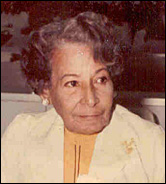
Photo courtesy of the author
 |
| Olinta Ariosa Morales Photo courtesy of the author |
In 1952, "looking for work and new horizons," she returned to Havana, where she enrolled in the School of Library Science, which, at that time, operated as an adjunct school to the University's humanities division. She received her library degree in 1953.
However, the unfavorable political, social, and economic situation of the times, and the lack of libraries, meant that even with her new degree, Olinta still found herself "looking for work," although, given the potential in the library profession for personal and social development, "new horizons" certainly did open up to satisfy her intellectual and professional restlessness.
Olinta, along with other classmates from school, began her professional life as a volunteer, under the direction of the well-known Argentine librarian and UNESCO expert on libraries, Carlos Victor Penna, who at that time was living in Havana. Their hard work established a library for Elementary School No. 2 in the Marianao district, one of the very first in Cuba to provide services to schoolchildren.
Always in search of new opportunities to create a better world, Olinta, like many young people of her generation, took part in revolutionary activities, for which she was imprisoned in 1955 by the Batista regime.
With the victory in 1959 of the Cuban Revolution, Olinta began to work on organizing and putting into operation the Municipal Library of Marianao, and in 1962, she was appointed head of the Department of School Libraries within the Ministry of Education.
Here she performed ground-breaking work to advance the condition of school library services in Cuba, both in administrative and scientific and technological areas. Surrounded by a circle of young professionals, she became a teacher and team-organizer, something quite different from the activities which would define the rest of her professional life. During this period, she also began teaching classes in librarianship at the Library School of the University of Havana, which she continued doing until 1965.
In 1972, she was named to the executive board of the Instituto de Documentación e Información Cientfica at the Cuban Academy of Sciences. Her outstanding accomplishments there laid the foundation for the modernization of information services in Cuba, by introducing instruction in the new techniques of data-processing and programming languages, the publication of texts, and the first exchanges with librarians from other countries.
When the Ministry of Culture was created in 1976, Olinta was chosen to head the Library Division, whose objective was the scientific and methodological development of Cuba's public libraries. She provided a system-wide focus for this task, improved the administrative structure of the Division, and concentrated efforts on library processing, and library services, including the use of "mini-libraries" to reach people. She initiated research into new aspects of librarianship, and strengthened sponsorship of professional meetings, conferences, and workshops.
Olinta promoted literacy programs in Braille for the visually-handicapped by creating special reading rooms for them and offering them specialized services. She introduced the concept of the ten cultural institutions of every town in the country, among which the library was viewed as the most important and the most basic; and established a strong international and professional network for the exchange of library ideas and personnel. During this period, she also served as director of the José Martí National Library.
Olinta was deeply committed to and very involved in the founding of ASCUBI, the Cuban Association of Librarians, and as its first president, she organized and oversaw the attendance of a group of Cuban librarians at the 1980 International Federation of Library Associations (IFLA) conference in Manila.
Her dedication, hard work, and achievements have been recognized with many honors and distinctions, such as the Bachiller y Morales Medal (el Sello Bachiller y Morales), awarded by the Cuban Association of Librarians; and the Cuban Culture Award (Distinción por la Cultura Cubana), presented by the Ministry of Culture.
Translated by Jane Carpenter
Marta Terry González is a former president of and consultant
(asesora) to the Cuban Library Association (ASCUBI) and professor at the
University of Havana, Cuba.
Email: martat [at] loynaz [dot] cult [dot] cu
Jane Carpenter is Cataloging Librarian at The Newberry
Library.
Email: carpenterj [at] newberry [dot] org
© 2005 Marta Terry González